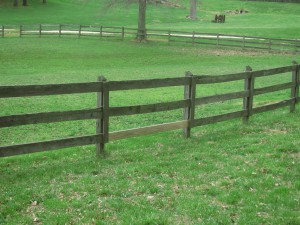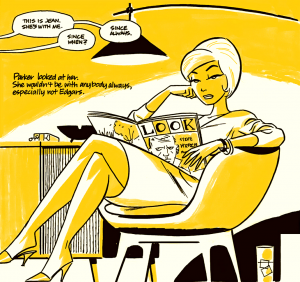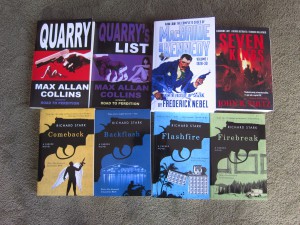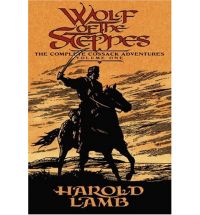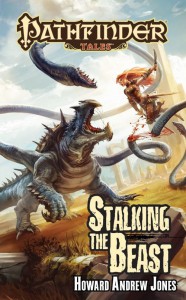 I’m having trouble sleeping again, but this morning at least I’m putting it to use and am up early writing. I’ve got a lot of work to do on two projects I’m really excited about, so I’ll keep the entry short.
I’m having trouble sleeping again, but this morning at least I’m putting it to use and am up early writing. I’ve got a lot of work to do on two projects I’m really excited about, so I’ll keep the entry short.
First, in my continuing effort to be everywhere on the Internet, I had a Q and A over on the Paizo boards about my upcoming novel, Stalking the Beast (which reminds me — I’ve got to create a “cover slide” for the new book so it can join the other four rotating at the top of my main page — hope I remember how!) You can find it here.
Second, on a long trip yesterday I started and finished Jack Vance’s Big Planet, courtesy of John O’Neill giving me one of his four extra copies (thanks, John!). I started to take Charles Saunders’ The Naama War — the fourth Imaro book — but was afraid it would get dinged up on the journey.
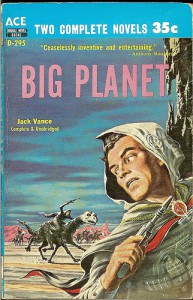 Big Planet was typical Vance and a great read, but it was also a product of its time. Lengthwise I can’t imagine it was much longer than 65 thousand words, which left barely any room for characterization. Vance can frequently be pretty light on characterization in some ways, although he will add details to even minor characters to bring a culture to life. But I don’t usually read Vance for his characters (unless said character is Cugel the Clever) I read him for the wild inventiveness about culture and events and amazing scenery, which he again, even in this early work, tosses off with careless ease that few others can even approach. Over the course of Big Planet the main characters travel through a vast landscape and encounter all manner of environments and societies, each different from the other and well described and fairly plausible even in their weirdness. And, as is almost always the case in his work, the pace never flagged. The man was a master and there’s still a lot to learn from him even while you’re enjoying his lighter fare.
Big Planet was typical Vance and a great read, but it was also a product of its time. Lengthwise I can’t imagine it was much longer than 65 thousand words, which left barely any room for characterization. Vance can frequently be pretty light on characterization in some ways, although he will add details to even minor characters to bring a culture to life. But I don’t usually read Vance for his characters (unless said character is Cugel the Clever) I read him for the wild inventiveness about culture and events and amazing scenery, which he again, even in this early work, tosses off with careless ease that few others can even approach. Over the course of Big Planet the main characters travel through a vast landscape and encounter all manner of environments and societies, each different from the other and well described and fairly plausible even in their weirdness. And, as is almost always the case in his work, the pace never flagged. The man was a master and there’s still a lot to learn from him even while you’re enjoying his lighter fare.
Having been written in the early 1950s, it has some artifacts of its time that it can’t really be blamed for. It’s assumed and never, ever questioned, that adventuring and important duties are for men — sexual equality isn’t even on the radar. It makes me wonder how I’d ever share this book with, say, my daughter. Most authors can’t be expected to look beyond their time, and I’m sure in 50 years, assuming anyone’s still reading my books, someone will find something that I’m not doing that makes me dated. Still, in contemplation of this sexism I can’t help thinking about Robert E. Howard’s Valeria, from “Red Nails.”
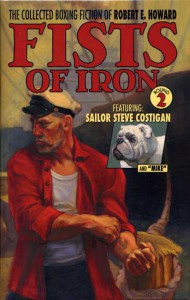 As frequent visitors to my site know, I’m a pretty big fan of Robert E. Howard’s writing. I’m not any kind of a boxing aficionado, but some years back I decided to pick up a copy of The Incredible Adventures of Dennis Dorgan, a Zebra paperback with a bevy of Howard’s tales about an American sailor named, wait for it, Dennis Dorgan. We see very little of Dorgan at sea, however, unless he’s just getting off his boat, because all of the tales involve him battling in one kind of boxing ring or another. I never finished the book, so I can’t tell you exactly why I went ahead and invested in the first two books of the complete boxing stories of Robert E. Howard.
As frequent visitors to my site know, I’m a pretty big fan of Robert E. Howard’s writing. I’m not any kind of a boxing aficionado, but some years back I decided to pick up a copy of The Incredible Adventures of Dennis Dorgan, a Zebra paperback with a bevy of Howard’s tales about an American sailor named, wait for it, Dennis Dorgan. We see very little of Dorgan at sea, however, unless he’s just getting off his boat, because all of the tales involve him battling in one kind of boxing ring or another. I never finished the book, so I can’t tell you exactly why I went ahead and invested in the first two books of the complete boxing stories of Robert E. Howard.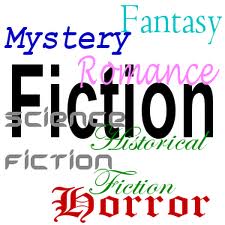 It’s a lot easier for me to be generous about other genres than it used to be. I’m trying to decide if that has something to do with me mellowing with age, or if it’s because there’s a whole lot more sword-and-sorcery available than there was ten years ago … or if it’s simply that I don’t feel shut out anymore now that I’m writing sword-and-sorcery stories for a living.
It’s a lot easier for me to be generous about other genres than it used to be. I’m trying to decide if that has something to do with me mellowing with age, or if it’s because there’s a whole lot more sword-and-sorcery available than there was ten years ago … or if it’s simply that I don’t feel shut out anymore now that I’m writing sword-and-sorcery stories for a living. When I tell people what a great writer Robert E. Howard was, a lot of them don’t seem to believe me. If they only know him through depictions of Conan or, worse, rip-offs, then they think Howard’s writing is all about a dull guy in a loin cloth fighting monsters and lots of straining bosoms. It’s not that Robert E. Howard thought himself above describing a lithesome waist or a wilting beauty, especially if he needed to make a quick buck, it’s just that there’s a lot more going on in a Conan story than his imitators took away.
When I tell people what a great writer Robert E. Howard was, a lot of them don’t seem to believe me. If they only know him through depictions of Conan or, worse, rip-offs, then they think Howard’s writing is all about a dull guy in a loin cloth fighting monsters and lots of straining bosoms. It’s not that Robert E. Howard thought himself above describing a lithesome waist or a wilting beauty, especially if he needed to make a quick buck, it’s just that there’s a lot more going on in a Conan story than his imitators took away.
